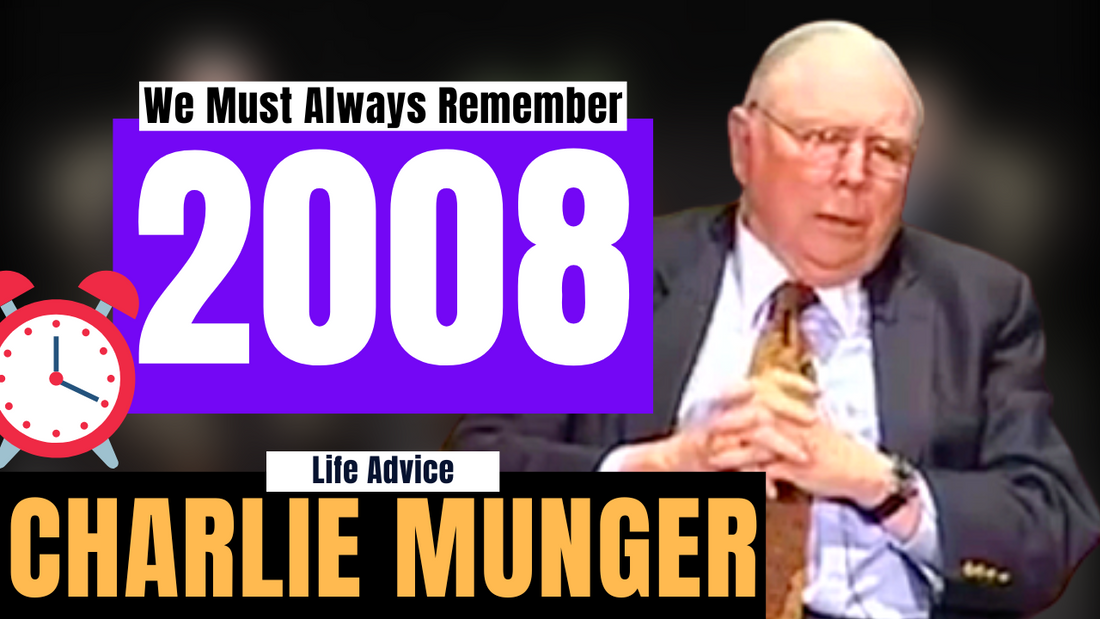
Charlie Munger: We Warned About 2008, but No One Listen... | Caltech 2008 【C:C.M Ep.240】
[Transcript]
AUDIENCE MEMBER: You've got a negative Lollapalooza effect in financial markets today. Charlie, any thoughts on how this plays out?
CHARLIE MUNGER: Well, when it's this bad, I think there will be some reaction and some change in practice and some change in laws. And if we don't get changes in laws, they'll change the labels. When they reinvent CDOs, they'll have some different name, they have poisoned that name permanently.
And but I think the lessons are just unbelievably important. An advanced civilization did not need this much mess. We didn't need this much lying. We did not need this much crazy, envy driven pursuit of unreasonable gains with no conceivable social contribution. This was not a pretty scene.
And yet it was something like the South Sea Bubble, as long as it was going on, nobody wanted anybody to criticize the party. And no, so I think there will be changes. Do I anticipate great wisdom from our legislative class?
TOM TOMBRELLO: I hope not.
CHARLIE MUNGER: Well, they gave us the problem in the first place. I mean, they repealed — Let's take like the simple little subject of margin requirements.
In the 20s, we had a great mess caused by 90% loans against stock and rampant speculation so on. So they passed tougher rules giving the Federal Reserve the right to control margins, which they did for a long time, the banks had to apply. There was none of this crazy credit when I was young, if you wanted to buy securities frequently had to put up 50%, sometimes 75%, sometimes 100% of the price of the security.
Fade-in fade-out, the class that was going to make money out of running derivative exchanges and all kinds of things. Option exchanges wanted the equivalent of a new gambling parlor where they could be the croupier. And so they talked up a lot of free market economic ideas and said after all, liquid markets, capitalism we have to...
And they created a derivative market that which totally obsolete the margin requirements that have been part of the American regulatory scene. Human nature needs margin requirements. Just as it needs restrictions on selling heroin to 14 years old.
And our legislative class, item by item, repealed all that stuff. And once they started making money, they just multiply it. And then they got into systems where the clearance is a huge problem.
And we're starting to see that now on some of these obligations where you can have the contract, but the contract can't clear — the other guy is not good for it. The procedures are not proper, It's like his insurance company that insured against hurricanes until it came to the island where they wrote the insurance. It's like what I called of the accounting for Berkshires' derivative book, it's a new class of asset entitled; "Good until reached for."
By the way, it was four hundred million dollars of the accountants blessed, but when we reached for it, it just went to miss. I don't think that you should have a lot of assets on your books that are in the category, "Good until reach for."
Anyway, this thing just morphed into this disease outcome. And so it's hard to predict what the legislative reaction will be. I think we've created such a vested interest now and all the people would profit from this stuff. That I don't think we're going back to margin requirements and I don't think we're getting rid of all these stock options exchanges.
I knew we never needed them. Warren went and testified before Congress that we didn't need this stuff. He was a solitary voice. One man was down there saying, "Why do we need option exchanges for?" But it didn't work then and I don't think it'll work now. It's really quite sad what happened.
You would like to feel that, as Tennyson said that "The thoughts of men are widened with the process of the suns." Why do we have to repeat the same old follies over and over again on a thin disguise. But evidently we do.
My friend, Garrett Hardin — wonderful man, another Caltech trained man — he used to say, "If Aristotle were alive he would be a very grumpy old man." Because he would have seen the same damn mistakes made over and over and over again. And that maybe some of the problem with me.
(Source: https://youtu.be/4ibabROYccs?si=AGQznfOPmt9tv3yg)
[YAPSS Takeaway]
Money is not the problem, not learning from the past is the problem here.
